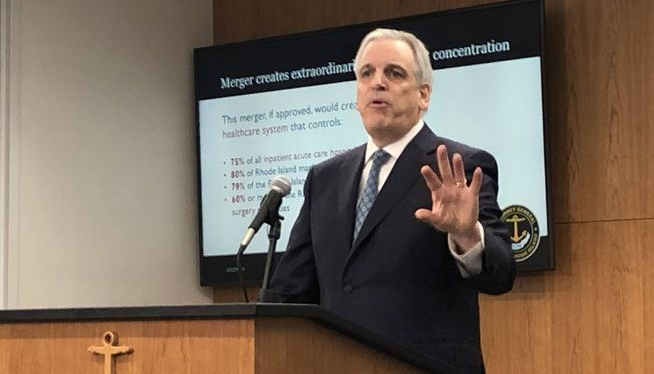
PROVIDENCE, R.I. (AP) — The proposed merger of Rhode Island’s two largest health care organizations was denied Thursday by the state attorney general’s office, which concluded that it would likely lessen competition and hurt health care costs, quality and access.
Attorney General Peter F. Neronha in denying the proposed merger between Lifespan and Care New England said the merged company would have so much market power that it would be in violation of state and federal trust laws.
“Put simply, if this extraordinary and unprecedented level of control and consolidation were allowed to go forward, nearly all Rhode Islanders would see their health care costs go up, for health care that is lower in quality and harder to access,” Neronha said.
If the companies are allowed to merge, they would control 75% of all inpatient acute care hospital beds in Rhode Island; 80% of the Rhode Island market for inpatient hospital care; and 79% of the Rhode Island market for inpatient psychiatric care, he said.
He also said that the systems failed to demonstrate the financial feasibility of a merger.
“Lifespan and Care New England are each currently in tenuous financial condition,” the decision said.
“Faced with an ongoing pandemic, and despite cash infusions from federal relief funds, the parties’ own financial projections raise a substantial concern of a combined Lifespan/CNE becoming financially unstable within a few years,” the decision said.
The state attorney general’s office will also join the Federal Trade Commission’s lawsuit to block the transaction, he said.
“We are extremely disappointed by the decision of the FTC, as we know that the status quo will not well serve the healthcare needs of the people of Rhode Island,” said Lawrence A. Aubin, Sr., Lifespan Board of Directors Chairman. “We are committed to continued work to meet those needs now and into the future.
Charles Reppucci, Care New England Board of Directors Chairman, said, “Rhode Island deserves the best possible solution to serve their health and wellbeing. While this is very disappointing, we will always keep the patients at the forefront and our teams will continue their day to day focus on patient care, and management will come together to thoughfully seek out the best solution for the future .”
Care New England President and CEO James E. Fanale, M.D., said, “Of course, we are disappointed, but I will say that we can truly know that we did everything we could over the past few years of hard work to get this done. We thought it was the right thing to do, but now we will need to move on to a new path forward. There is always a path forward, and we will explore all options to find the best possible – and acceptable to regulatory bodies –solution for access to affordable, quality, health care.”
“A Rhode Island solution, that remains nonprofit, and creates the state’s first fully integrated academic health care system is what we seek to accomplish for the state and that remains our overriding goal,” said Lifespan President and CEO Timothy J. Babineau, M.D. “We have articulated the incredible and transformative value to the state in making that vision a reality. Further, the healthcare market for Rhode Island spans outside the borders of the state, well into MA and CT, and so too should the economic and competitive considerations to allow us to create the same type of health care system that many other cities including Boston, New Haven, Pittsburgh and many others are able to enjoy. I am deeply disappointed in today’s decisions.”
Senate President Dominick Ruggerio said in a statement that he “appreciates the thorough review conducted by the Attorney General and will review the decision before taking any further steps. My foremost concerns remain the same – ensuring every Rhode Islander has access to a public health system that provides robust care, fosters partnerships with our research-based institutions, and drives equitable access to care while sustaining and creating jobs in this critical sector of our economy.”
Speaker of the House Joseph Shekarchi said “I thank the presidents, members of the boards of directors, and the teams at both Lifespan and Care New England for their hard work on this proposed merger application. I encourage the two hospital groups and Brown University to immediately terminate their exclusivity agreement and explore all options available to them in the marketplace. My primary concern has always been to ensure continued high-quality health care for all Rhode Islanders and to protect the employment of the thousands of hard-working front-line professionals.”
The organizations last February announced they had signed a merger agreement that included a collaboration with Brown University’s medical school to create what they called an integrated statewide health care system.
There had been previous efforts to merge, but the latest effort was prompted by increased cooperation between the organizations during the coronavirus pandemic.
Lifespan, the larger of the systems, operates Rhode Island, the Miriam, Hasbro Children’s, Newport and Bradley hospitals. Care New England runs Women & Infants, Kent and Butler hospitals.













